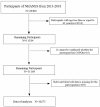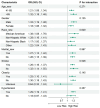The Relationship Between Serum Inflammatory Markers and Chronic Obstructive Pulmonary Disease in Middle-Aged and Older Adults in the United States: A Cross-Sectional Study Based on NHANES 2013-2018
- PMID: 40827237
- PMCID: PMC12358117
- DOI: 10.2147/COPD.S534504
The Relationship Between Serum Inflammatory Markers and Chronic Obstructive Pulmonary Disease in Middle-Aged and Older Adults in the United States: A Cross-Sectional Study Based on NHANES 2013-2018
Abstract
Objective: Chronic obstructive pulmonary disease (COPD) is a chronic respiratory disease characterized by increased inflammation, persistent decline in lung function, and extensive lung damage. Research has shown that inflammation plays a crucial role in the formation and progression of COPD. The systemic inflammation response index (SIRI) is an emerging inflammatory biomarker whose clinical significance in COPD remains undetermined. This study aims to explore the potential association between serum inflammatory marker SIRI levels and the prevalence of COPD.
Methods: This cross-sectional study utilized data from the National Health and Nutrition Examination Survey (NHANES) database from 2013-2018. A total of 10,273 participants were analyzed and divided into two groups: COPD (n = 595) and non-COPD (n = 9678). Comparative analysis of demographic and clinical characteristics was performed between cohorts. The SIRI was calculated based on the counts of monocytes, neutrophils, and lymphocytes. Weighted logistic regression models were applied to assess the association between SIRI and COPD, while restricted cubic spline (RCS) curves were utilized to investigate potential non-linear relationships. Additionally, subgroup and interaction analyses were performed.
Results: Our study included 10,273 participants, of whom 595 were diagnosed with COPD, while 9678 were diagnosed with non-COPD. In the fully adjusted logistic regression model, SIRI was significantly positively correlated with COPD (OR = 1.96, 95% CI = 1.34-2.87). The analysis of the RCS curve revealed a non-linear relationship between SIRI and COPD (P < 0.05). Subgroup and interaction analyses further confirmed the robustness of our findings.
Conclusion: Serum inflammatory marker SIRI levels are positively correlated with the occurrence of COPD and exhibit a non-linear relationship.
Keywords: NHANES; SIRI; chronic obstructive pulmonary disease; cross-sectional study; inflammatory markers.
© 2025 Chen et al.
Conflict of interest statement
The authors declare no competing interests.
Figures
Similar articles
-
Examining the mediating function of SIRI in the association between LC9 and chronic obstructive pulmonary disease.Front Med (Lausanne). 2025 Jul 9;12:1606864. doi: 10.3389/fmed.2025.1606864. eCollection 2025. Front Med (Lausanne). 2025. PMID: 40703262 Free PMC article.
-
Association between complete blood count-derived inflammatory biomarkers and renal failure: a cross-sectional study from NHANES 2007-2020.BMJ Open. 2025 Sep 1;15(9):e103381. doi: 10.1136/bmjopen-2025-103381. BMJ Open. 2025. PMID: 40889986 Free PMC article.
-
Impact of systemic immune inflammation index and systemic inflammation response index on all-cause and cardiovascular mortality in cardiovascular-kidney-metabolic syndrome.Eur J Med Res. 2025 Jul 21;30(1):645. doi: 10.1186/s40001-025-02929-1. Eur J Med Res. 2025. PMID: 40685352 Free PMC article.
-
Computer and mobile technology interventions for self-management in chronic obstructive pulmonary disease.Cochrane Database Syst Rev. 2017 May 23;5(5):CD011425. doi: 10.1002/14651858.CD011425.pub2. Cochrane Database Syst Rev. 2017. PMID: 28535331 Free PMC article.
-
Immunostimulants versus placebo for preventing exacerbations in adults with chronic bronchitis or chronic obstructive pulmonary disease.Cochrane Database Syst Rev. 2022 Nov 14;11(11):CD013343. doi: 10.1002/14651858.CD013343.pub2. Cochrane Database Syst Rev. 2022. PMID: 36373977 Free PMC article.
References
LinkOut - more resources
Full Text Sources




